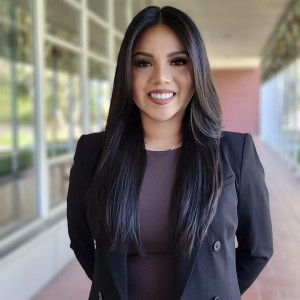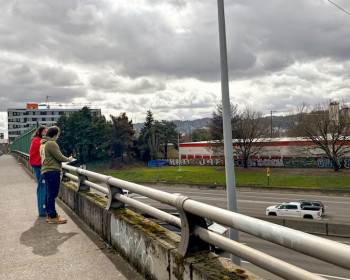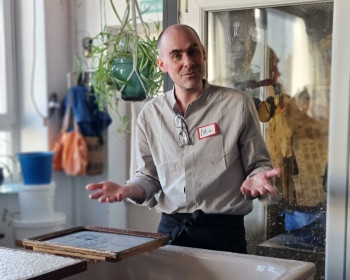Arcelia Pena-Baltazar (she/her/ella)
School Psychology, EdS ’24
Arcelia is the 2024 graduate student commencement speaker. The Graduate School Commencement Ceremony is June 2nd in Pamplin Sports Center.

My professional experience working with the youth in those facilities sparked my interest in digging deeper into what some of them had experienced, understanding their lived experiences, and figuring out how I could be a part of a preventative system rather than the last stop.
“For many of them, school was a common topic of discussion,” she explains. “They identified school as a safe and consistent place, yet it still lacked connection and understanding of their particular experiences.”
Pena-Baltazar shares the words of one of her clients, uttered over a game of chess, noting that it was his heartfelt wish for his mother to understand his mental health challenges. She says these words have stayed with her long after she forgot the result of their chess duel.
“Ms. Pena, if my mom were here right now, listening to me talk, she’d probably still look at me as if I was making up excuses. She never understood why I was doing so badly in school. She would hear that I was failing classes, and I would get hit at home because of that and get called ‘lazy.’ She’d always say, ‘Stop your nonsense, and figure it out.’ I know she doesn’t understand many things, but I wish she had just taken the time to listen and try to understand me.”
“I completely understood what he meant, being raised in a predominantly Latinx-populated community,” says Pena-Baltazar. “Having access to those who ‘get it’ and who understand that mental health issues exist, even within the Latinx culture, was more of an exception rather than the rule. You often sought help from various school resources but had to explain why things were the way they were in Latinx culture before getting any real help. Most school supports did not represent us and could not understand all the various cultural pressures unique to Latinx. Many times, you felt discouraged to go through all that trouble for little help.”
Pena-Baltazar further explains that trying to bring up the topic of mental health-related issues to your parents was taboo.
“It affected parents as well, often questioning their parenting skills or shifting blame to their child for not “working hard” enough to excel in school. I knew I wanted to change that for other students.”
On the night of that conversation and chess duel, Pena-Baltazar clocked out of her shift, went home, and searched different career options that:
- Were involved in doing preventative work
- Supported students in schools
- Kept her in the mental health field
- Allowed her to partner with families to support students
- Provided some variety in her role
- And, most importantly, kept her connected with students
And that’s how she learned that there’s a field called School Psychology.
“When I found the educational specialist program at Lewis & Clark, I immediately identified with its mission. Lewis & Clark’s focus on social justice not only makes the application process accessible, but the level of support the program has provided has made me feel that much more confident to step into the education field to serve students and families. Reflecting on what I’ve learned and accomplished in the last three years, I wouldn’t have been able to complete this program without the support of my family, cohort, supervisors, and instructors.”
Pena-Baltazar says she was often asked during the last three years to share her “why.” It revolves around supporting students in order to help them thrive, not just academically but as individuals as well. It is important to her that support systems represent the students and families they serve, helping to close the gaps that exist between families, the community, and the education system.
As I continue my journey at Lewis & Clark and prepare to enter the education system, I am driven by a passion for social justice and equity in education. My experiences have shaped my commitment to creating inclusive and supportive environments where all students can flourish.
Moving forward, Pena-Baltazar remains dedicated to leveraging her skills in school psychology to advocate for historically underrepresented communities and enact positive change within the education system. With the unwavering support of her loved ones and the inspiring community at Lewis & Clark, she feels confident in her ability to make meaningful contributions toward a more just and equitable future for all.

